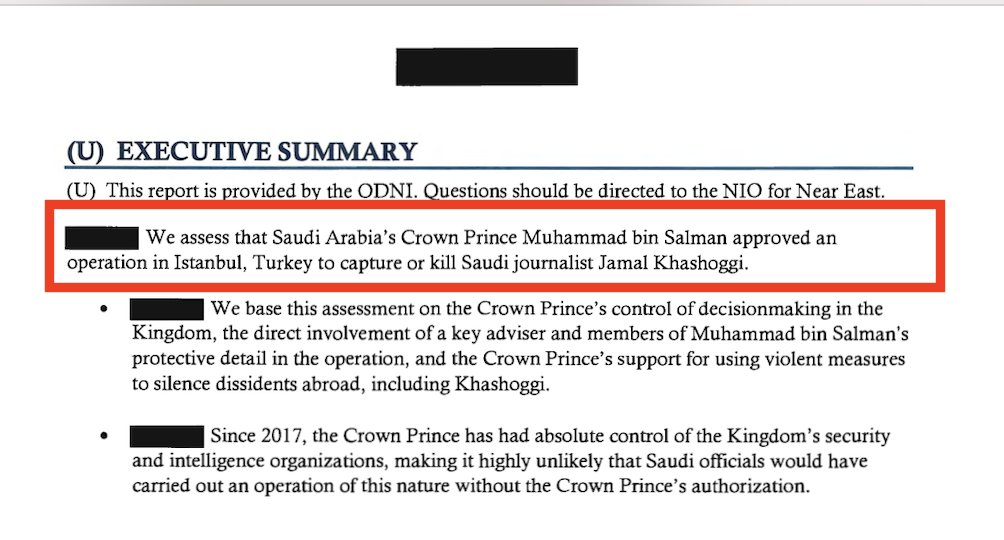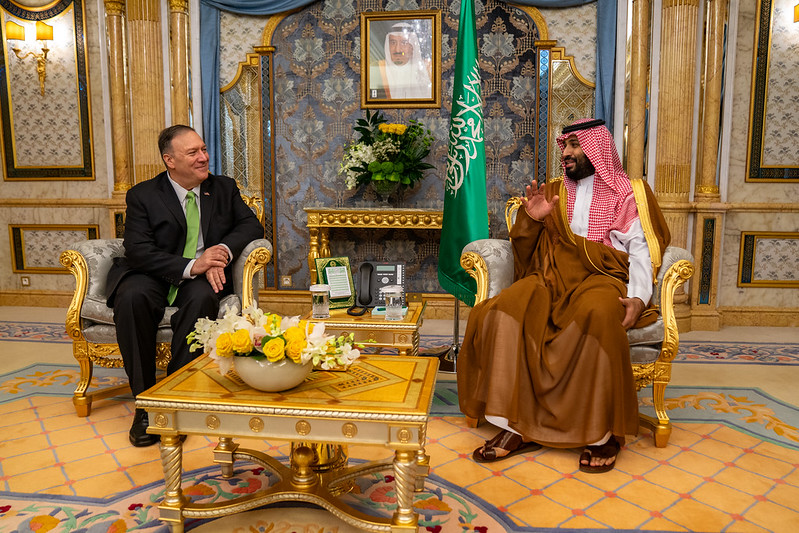After an unexplained delay of 24 hours, the Biden administration, through the Office of the Director of National Intelligence, released the executive summary of the CIA’s classified assessment that Saudi Arabia’s Crown Prince Mohammed bin Salman ordered the operation that led to Washington Post columnist Jamal Khashoggi’s 2018 murder and dismemberment.
The key findings are below:

News that the Intelligence Community believes MBS was responsible for Khashoggi’s death leaked in November 2018, so this isn’t some kind of revelation. What’s different is that the Biden administration is publicly acknowledging this fact, while Trump was at pains to confuse the matter, saying at the time, “Our intelligence agencies continue to assess all information, but it could very well be that the Crown Prince had knowledge of this tragic event — maybe he did and maybe he didn’t! That being said, we may never know all of the facts surrounding the murder of Mr. Jamal Khashoggi.”
For Trump, a main concern was to prevent the public or Congress from demanding strong action against the Crown Prince that might complicate the bilateral relationship. The Biden administration differs mainly in its willingness to be transparent and take the heat. They appear just as apprehensive about angering the Saudis as the Trump administration, and their weak response is already receiving a scathing response. For example, New York Times columnist Nicholas Kristof, who counted Khashoggi among his friends, writes that “President Biden choked” and “appears ready to let the murderer walk.”
Despite removing support for Saudi Arabia’s role in Yemen’s civil war and putting a temporary stop on all weapons sales to the kingdom, the Biden administration’s “recalibration” of U.S.-Saudi relations upon coming into office hasn’t led to stronger measures. In particular, calls for MBS to be sanctioned and officially denied entry into the United States were not heeded. Nor were calls for a permanent ban of weapons sales.
This seems like a broken promise, as on the campaign trial Biden said there is “very little social redeeming value in the present government in Saudi Arabia,” and promised to make them pay a price for the butchering of Khashoggi. Yet, it’s not as if the Biden administration has done nothing. In a call on Thursday with the 85-year old King Salman, Biden announced some modest repercussions.
Those actions, approved by Secretary of State Antony J. Blinken, include a travel ban on Saudi Arabia’s former intelligence chief, who was deeply involved in the Khashoggi operation, and on the Rapid Intervention Force, a unit of the Saudi Royal Guard that protects Prince Mohammed — and is under his direct control.
Unfortunately, challenging the Saudis is neither easy nor cost-free, and David Sanger of the New York Times reports that Biden was convinced by his national security team that confronting MBS too severely is not a viable strategy.
The decision by Mr. Biden…came after weeks of debate in which his newly formed national security team advised him that there was no way to formally bar the heir to the Saudi crown from entering the United States, or to weigh criminal charges against him, without breaching the relationship with one of America’s key Arab allies.
Officials said a consensus developed inside the White House that the cost of that breach, in Saudi cooperation on counterterrorism and in confronting Iran, was simply too high.
Of course, we don’t know how the Saudis approached the situation. Knowing that the public release of the intelligence assessment was imminent, they may have made some credible threats that convinced the Biden administration to tread lightly. There are many American interests in play beyond cooperation on counterterrorism and Iran’s nuclear ambitions, and it’s hard for an outsider to assess the stakes.
Having said that, Kristof makes a good point here:
But in this great balancing of values and interests, the towering risk is that M.B.S., who is just 35, will become king upon the death of his aging father and rule recklessly for many years, creating chaos in the Gulf and a rupture in Saudi-American relations that would last decades.
In other words, it’s precisely because Saudi Arabia is so important that Biden should stand strong and send signals — now, while there is a window for change — that the kingdom is better off with a new crown prince who doesn’t dismember journalists.
Kristof presumes, however, that U.S. pressure could have convinced an infirm 85-year old king to change his heir but it may be the intelligence community’s opinion that it is simply too late for that. If so, the next king will be a sociopath, and we’ll find out that avoiding confrontation now did not mean that confrontation could be indefinitely avoided.
As it stands, a different Saudi dissident disappeared last month after visiting the kingdom’s embassy in Ottawa. When we find out what happened to that individual, Biden may regret not taking a tougher line now.
